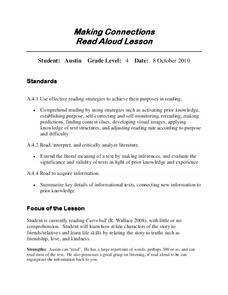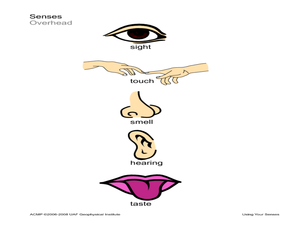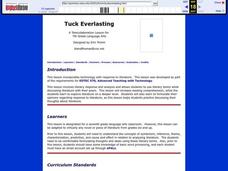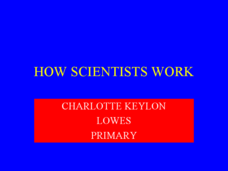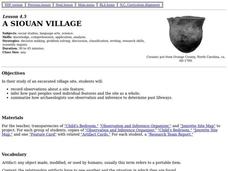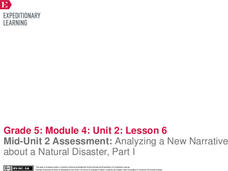Curated OER
Matthew Henson
Discuss the work of Matthew Henson, an African American who traveled to the North Pole with Robert Peary. After reading the story "Matthew Henson" by Maryann N. Weidt, learners answer questions by drawing inferences and conclusions,...
Curated OER
African Folktales Lesson
Students explore what a folktale consists of as it relates to oral tradition. In this folktale lesson, students are told the African folktale, Why the Sun is Lives in the Sky and make personal inferences about what the folktale is...
Curated OER
Making Connections
Fourth graders investigate visual imagery to aid reading comprehension. In this reading strategies lesson, 4th graders discover how visual imagery helps in comprehending a story. Students use a reader's notebook to record connections.
Curated OER
Making Inferences: Scenario Worksheet
In this making inferences worksheet, learners read 5 statements and they write what they can infer about each statement. Students make their own inference scenario and identify what they can infer from their scenario.
Curated OER
The Diary of Anne Frank
Eighth graders read the Diary of Anne Frank. In this novel reading lesson, 8th graders read and analyze the story. Students do online activities and create a newspaper giving a summary of three major events in the story. Students answer...
Curated OER
Using Your Senses
Young scholars make observations. In this sensory skills lesson plan, students use their senses as well as tools that sharpen their senses to make observations regarding foods and other items.
Curated OER
Making Inferences and Drawing Conclusions
Second graders make several inferences based on the reading of Shel Silverstein poems. They write their own poetry and complete an assessment in which they differentiate between sentences that are stated or inferred.
Ohio Department of Education
Observe Then Infer
To develop their skill at drawing inferences from observations, sixth graders rotate through six stations, conduct a series of experiments, make observations, and draw inference from what they observe.
Curated OER
Tuck Everlasting
Seventh graders use literary terms while discussing literature with their peers. They explore literature on a deeper level. Students formulate their opinions regarding response to literature, as this lesson helps students practice...
K20 LEARN
OPTIC - A Reading Strategy Recipe: Visual Literacy
A visual literary lesson plan provides learners with OPTIC (Observations, Predictions, Themes, Inferences, Conclusions), a reading strategy to help them understand and interpret visual and written texts. Scholars practice the strategy...
Curated OER
How Scientists Work
The arsenal of tools a scientist uses to observe the world are varied. This great presentation gives young scholars a look at some of the strategies they should use when looking at the world around them. The information can be used as a...
Curated OER
A Siouan Village
Fourth graders examine the artifacts obtained from an excavated Siouan village site. They make inferences about the people who once lived there based on the artifacts and complete a Research Team Report.
Curated OER
Motel of Mysteries
Students determine that even though inferences are based on observations that does not mean they are always true or correct. They pull the topics and main ideas out of a piece of difficult text.
Curated OER
Pop Rock Chemistry
In this pop rock chemistry worksheet, students suck on pop rocks, they mix open pop rocks with water and they observe them on a paper towel with water. Students write down as many observations as they can and they write down as many...
Curated OER
Tomas and the Library Lady
Young scholars practice read aloud comprehension strategies. In this literacy comprehension lesson, students listen to Tomas and the Library Lady, stopping to discuss with a partner aspects of the story suggested by the teacher. Young...
Curated OER
The Gingerbread Boy Comes Alive
Students make cut-out gingerbread cookies. After reading "The Gingerbread Boy", their cookies "disappear" and students must make predictions and draw conclusions about what happened to their cookies.
Workforce Solutions
On the Job
Four lessons spotlight a variety of professions while boosting listening and observational skills and making inferences. Lesson one challenges pupils to group cards based on a commonality then justify the relationship they see....
EduGAINs
Data Management
Using a carousel activity, class members gain an understanding of the idea of inferences by using pictures then connecting them to mathematics. Groups discuss their individual problems prior to sharing them with the entire class....
Curated OER
The True Confessions of Charlotte Doyle: Graphic Organizer
After completing the first five chapters of The True Confessions of Charlotte Doyle By Avi, use direct quotes to make inferences about how Charlotte feels about certain characters. Later, when the novel has concluded, revisit...
NOAA
History's Thermometers
How is sea coral like a thermometer? Part three of a six-part series from NOAA describes how oceanographers can use coral growth to estimate water temperature over time. Life science pupils manipulate data to determine the age of corals...
Prestwick House
"Because I could not stop for Death" -- Visualizing Meaning and Tone
Emily Dickinson's "Because I could not stop for Death" provides high schoolers with an opportunity to practice their critical thinking skills. They examine the images, diction, rhythm, and rhyme scheme the poet uses and consider how...
CPALMS
Analyzing Vonnegut's View of the Future and His Commentary on the Present in Harrison Bergeron
Kurt Vonnegut's short story "Harrison Bergeron" engages adolescents with its theme about the dangers of complete societal equality. Learners complete a graphic organizer to track literary elements in the story, as well as an inference...
EngageNY
Mid-Unit 2 Assessment: Analyzing a New Narrative about a Natural Disaster, Part I
Scholars complete a mid-unit assessment by analyzing a narrative text, In the Middle of the Storm. Learners determine the gist of the text, identify synonyms, make inferences, and answer text-dependent questions to demonstrate...
Curated OER
Arc GIS Project: Visualizing the Holocaust
A cross-curricular lesson for middle schoolers that covers language arts, social studies, geography, and math, this is a great extension activity if your class is reading The Diary of Anne Frank or learning about the Holocaust....




